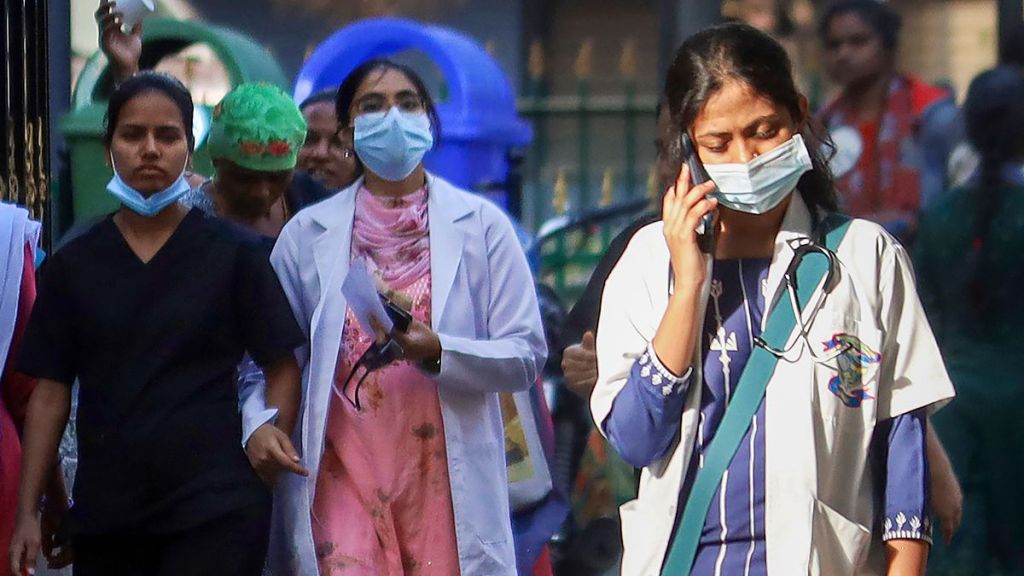H3N2 influenza outbreak in India: The cases of H3N2 influenza are rising across the country. According to doctors, there is also a spike in ICU admissions of the elderly and kids due to H3N2 influenza. As the symptoms of this viral infection are similar to COVID-19, the doctors have advised to extreme precautions and masking up to prevent the spread of the virus.
Other than H3N2, the country is also witnessing a surge in COVID-19 and swine flu infections. According to the real-time surveillance data by the integrated disease surveillance programme (IDSP), 955 cases of H1N1 also known as swine flu have been reported by states till 28 February.
Here are the latest updates on H3N2 influenza outbreak in India:
- All schools in Puducherry will remain shut from 16 March (Thursday) to 26 March (Sunday). As of 11 March, Puducherry reported 79 cases of influenza, belonging to the viral H3N2 subtype so far.
- Genome sequencing data has revealed that Influenza A H3N2 and influenza B Victoria are two viral strains driving the current surge of flu cases in the country. In the nine weeks between January 2 to March 5, laboratories connected to the surveillance network of the Indian Council of Medical Research (ICMR) found 451 positive results for influenza A H3N2, 91 positive results for influenza B Victoria and 41 for influenza A H1N1, a government statement said on Tuesday.
- The Union government asked states to up surveillance following the surge in influenza cases.
- The total number of H3N2 flu cases reported in Kerala has touched 13, as per the state health department.
- A 58-year-old Gujarat woman died due to flu-like symptoms at a state-run hospital in Vadodara city. According to reports, the sample has been sent for H3N2 testing and the review committee will determine the exact cause of the death. With this, India’s death toll due to the H3N2 virus climbed to seven.
- Last week, Gujarat has reported three cases of seasonal influenza subtype H3N2 so far this year, as per Health Minister Rushikesh Patel.
- Several ICU cases of kids, under the age of 5, have been reported in Pune. Similarly, Delhi is also witnessing a spurt in ICU cases of elderly patients.
- An 87-year-old man from Karnataka’s Hassan district was the first patients to succumb to H3N2 infections on March 1.
- According to data shared by the Health Ministry on Friday, India has reported 451 cases of the H3N2 virus between January 2 and March 5.
- The Indian Council of Medical Research (ICMR) has issued an advisory asking people to avoid self-medication and the use of antibiotics in case of contracting the virus.
According to the US Centre for Disease Control and Prevention (CDC), the virus is typically found in pigs and is a non-human influenza virus that has now infected humans. Symptoms include fever for 3 to 5 days, persistent cough, chills, breathlessness, wheezing, runny nose, nausea, sore throat, body ache, and diarrhea in some cases.
According to doctors and health experts, the virus spreads through coughing, sneezing, and close contact with an infected person and is highly contagious.
“W have seen a 10% increase in the number of users taking cold and fever consultations in the last one week alone. The current increase in respiratory illnesses has been attributed to the H3N2 virus by ICMR. It is important that we all understand and take the right steps to minimise the effect. This is a subtype of the influenza A virus that is known to cause seasonal flu. Symptoms usually include fever, cough and cold, aches and pains, tiredness and can last for upto 1 week. In some cases, sore throat, loss of appetite, nausea and vomiting, diarrhoea, and wheezing is also seen. Those at the highest risk include children under 5, older adults over 65, pregnant women, and individuals with certain long-term health conditions. To prevent the spread of the virus, it’s essential to practice good hand hygiene, wear masks in crowded and poorly ventilated spaces, and avoid touching your face,” Dr. Gowri Kulkarni, Head of Medical Operations, MediBuddy told Financial Express.com.
Dr. Kulkarni also emphasised that annual flu vaccination is recommended, especially for those at high risk.
“If you do get sick, please take rest, hydrate and consult a doctor who may prescribe medications to relieve fever, cold, and cough, depending on the symptoms. Avoid taking antibiotics unless prescribed by doctors. Let’s all do our part to keep ourselves and our communities healthy,” Dr. Kulkarni told Financial Express.com.









